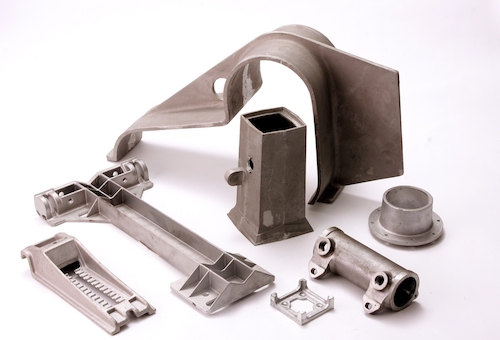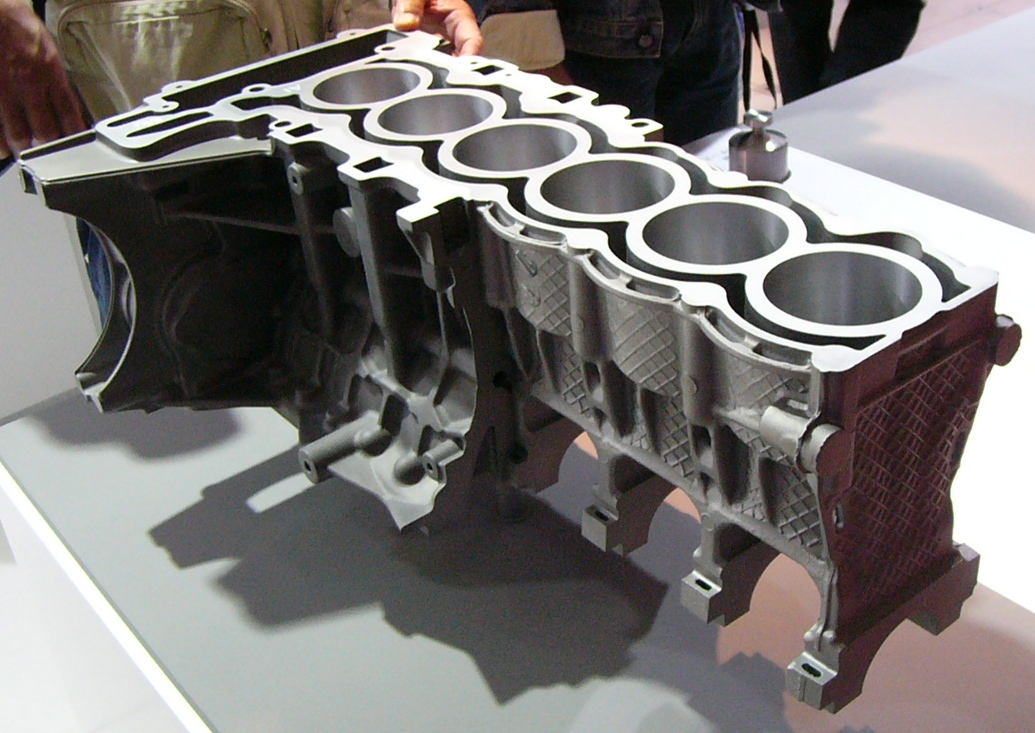The science behind producing durable Metal Castings
Wiki Article
Discovering the Versatile Uses and Applications of Light Weight Aluminum Castings in Modern Industries
Light weight aluminum castings have ended up being important to different modern-day sectors because of their one-of-a-kind residential properties. They use considerable benefits in weight reduction, thermal conductivity, and rust resistance. From automotive technologies to applications in durable goods and building, their flexibility is impressive. Yet, truth extent of their impact expands past immediate benefits, meaning wider ramifications for sustainability and performance. What exists ahead for light weight aluminum castings in an ever-evolving industrial landscape?Automotive Sector Innovations
The auto sector has progressively welcomed aluminum castings to enhance car efficiency and effectiveness. By making use of light weight aluminum, manufacturers can produce lighter elements, which add to boosted gas economic climate and decreased exhausts. Secret applications include engine blocks, transmission cases, and architectural components, where the product's strength-to-weight proportion provides toughness without including excess weight.Aluminum spreadings likewise provide premium thermal conductivity, which assists in better warmth dissipation, consequently enhancing engine performance. Moreover, improvements in casting technologies, such as die spreading and sand casting, make it possible for the manufacturing of intricate geometries, enabling cutting-edge layouts that enhance space and performance.
The recyclability of aluminum straightens with sustainability goals in the auto field, promoting eco-friendly techniques. As the sector remains to innovate, making use of aluminum castings is likely to increase, driving additional innovations in lorry design and performance.
Aerospace Applications and Improvements
While the aerospace industry continues to focus on weight reduction and gas efficiency, light weight aluminum castings have emerged as a critical material selection for numerous applications. Their lightweight nature, combined with high strength-to-weight ratios, permits considerable enhancements in airplane efficiency and performance. Aluminum spreadings are commonly made use of in structural parts, such as fuselage frameworks and wing components, where minimizing weight is crucial.Recent developments in light weight aluminum casting modern technologies, consisting of improved alloy solutions and precision casting strategies, have even more improved the material's performance abilities. These developments enable the production of intricate geometries and complex styles while preserving structural integrity. Additionally, light weight aluminum's exceptional deterioration resistance warranties long life and integrity in severe aerospace environments.
As the aerospace industry significantly accepts sustainability, aluminum spreadings provide a recyclable service that straightens with environmentally friendly techniques, making them an essential component in the growth of next-generation airplane.
Customer Item and Everyday Products
As customers increasingly seek lightweight yet resilient products for everyday products, aluminum spreadings have gained appeal in various consumer goods. The distinct homes of light weight aluminum, including its resistance to corrosion and outstanding thermal conductivity, make it a perfect option for items like kitchenware, house devices, and outside equipment. Light weight aluminum cast frying pans and pots offer also heat circulation, improving cooking effectiveness. Furthermore, using aluminum in products such as bike frames and baggage ensures an equilibrium between toughness and mobility. Manufacturers appreciate aluminum castings for their versatility, as they can be conveniently molded right into complex shapes while preserving structural stability. The capacity to recycle light weight aluminum without weakening its buildings aligns with expanding consumer preferences for lasting products. In general, light weight aluminum castings are essential to the manufacturing of durable, useful, and aesthetically pleasing durable goods, meeting the needs of modern way of lives.Building And Construction and Architectural Makes Use Of
Light weight aluminum castings have ended up being a vital component in building and construction and architectural design, particularly because of their strength and light-weight nature. These residential or commercial properties make aluminum an ideal selection for numerous applications, including structural components, exteriors, and decorative functions - Aluminum Castings. Home builders and engineers progressively utilize aluminum castings for window frames, doors, and roof, enhancing both functionality and visual appeals. The material's resistance to rust additionally extends its lifespan, lowering maintenance costs and ensuring longevity in diverse environmental conditionsAluminum can be conveniently molded right into complex styles, enabling for innovative building expressions. Its flexibility assists in the creation of customized items that fulfill particular layout demands, from luxuriant railings to intricate assistances. As sustainability comes to be a top priority, light weight aluminum's recyclability includes in its appeal in eco-friendly building practices. In general, light weight aluminum castings are reinventing the construction industry by supplying light-weight, sturdy, and aesthetically enticing remedies.
Electric and Electronic Components
Aluminum spreadings play an essential function in the production of lightweight electrical enclosures, which enhance portability and efficiency in various applications. On top of that, their outstanding thermal conductivity makes them ideal for warm sinks, making sure peak performance and longevity of digital elements. In addition, light weight aluminum's conductive buildings add to its usage in different electrical conductors, emphasizing its significance in contemporary technology.Lightweight Electrical Rooms
Light-weight electrical enclosures play a necessary role in shielding sensitive electronic elements from ecological factors and physical damage. Constructed from aluminum castings, these enclosures are valued for their strength-to-weight proportion, making them suitable for various applications across sectors. Their lightweight nature aids in lowering total system weight, which is crucial in portable and mobile electronics. Aluminum's corrosion resistance boosts toughness, prolonging the life expectancy of the enclosed elements. The ability to mold and mildew aluminum into intricate forms permits personalized designs, dealing with certain demands while guaranteeing efficient heat dissipation. In addition, these units can be quickly integrated right into existing systems, giving flexibility and convenience in modern-day technical environments. In general, lightweight aluminum enclosures greatly add to the effectiveness of electronic devices.Heat Sinks and Conductors
While many materials are made use of in electronic components, light weight aluminum castings stand out for their performance in warm administration as warm sinks and conductors. Their exceptional thermal conductivity allows for reliable warm dissipation, which is vital in preventing the overheating of digital devices. Light weight aluminum's lightweight nature better enhances its viability for applications where weight is a significant factor, such as in aerospace and auto markets. In addition, aluminum spreadings can be quickly built into complicated shapes, offering design flexibility for optimizing thermal performance. The rust resistance of light weight aluminum likewise contributes to the long life and dependability of these elements in different environments. As modern technology developments and gadgets end up being more small, the demand for efficient warm management remedies, like aluminum castings, remains to expand.Marine Industry Use
The aquatic market progressively counts on aluminum castings for their phenomenal resilience and deterioration resistance. These properties make light weight aluminum an excellent choice for different applications, consisting of watercraft hulls, engine parts, and marine hardware. The light-weight nature of aluminum castings allows improved gas performance and much easier ability to move in boat, which is important for both entertainment and commercial vessels.
Aluminum castings also offer substantial expense advantages because of their lengthy life expectancy and reduced maintenance requirements, decreasing the general functional expenditures for aquatic operators. Furthermore, the convenience of light weight aluminum enables for elaborate designs that can fulfill particular performance demands.
Manufacturers in the aquatic market use innovative spreading methods to create complicated shapes, making certain that parts satisfy rigorous safety and efficiency criteria. As the demand for high-performance marine vessels expands, light weight aluminum spreadings are placed as an essential material in improving the functionality and longevity of aquatic tools.
Sustainability and Recycling in Light Weight Aluminum Casting

Light Weight Aluminum Recycling Refine
Recycling light weight aluminum plays a vital duty in reducing environmental effect and preserving resources within the spreading sector. The light weight aluminum reusing procedure starts with the collection of scrap light weight aluminum, which can include old components, producing waste, and post-consumer items. This scrap is then arranged, cleaned up, and shredded into tiny pieces to assist in melting.Once prepared, the aluminum scrap is thawed in a furnace at reduced temperature levels than main light weight aluminum production, substantially reducing power usage. The molten light weight aluminum is after that cast right into ingots or other shapes for reuse in various applications - Aluminum Castings. This closed-loop system enables for the effective healing of aluminum, preserving its residential properties while decreasing the requirement for virgin products. As a result, the recycling process is an important element of lasting techniques in light weight aluminum spreading
Environmental Benefits
While aluminum casting plays a critical duty in various sectors, its environmental benefits are particularly amazing regarding sustainability and resource preservation. The lightweight nature of light weight aluminum adds to power efficiency in transportation, minimizing gas usage and emissions. Furthermore, light weight aluminum casting promotes the use of recycled materials, greatly reducing the power required for production contrasted to main aluminum. This reusing procedure lessens waste and decreases the environmental influence related to mining and refining raw materials. Aluminum is 100% recyclable without degradation of its homes, advertising a lasting lifecycle. By choosing aluminum spreading, sectors can considerably minimize their carbon footprint while advertising source performance, making it an essential selection in the search of eco-friendly production practices.Closed-Loop Equipments

Regularly Asked Concerns
What Are the Key Perks of Aluminum Castings Over Other Products?
Light weight aluminum castings provide light-weight residential or commercial properties, superb deterioration resistance, and high strength-to-weight ratios. They can be quickly built into complex shapes, supply good thermal and electric conductivity, and are cost-effective, making them more suitable over many alternative materials.Just how Is the Aluminum Spreading Process Ecologically Friendly?
The aluminum spreading process is ecologically pleasant as a result of its recyclability, low energy usage, and reduced waste production. Its capability to utilize recycled products lessens the carbon footprint, advertising sustainability within manufacturing methods.What Are Typical Obstacles in Aluminum Spreading Manufacturing?
Usual challenges in aluminum casting production include preserving dimensional accuracy, managing thermal contraction, protecting against issues like porosity and additions, making certain proper mold and mildew layout, and maximizing production efficiency while reducing product waste and environmental impact.Just How Do Light Weight Aluminum Castings Contrast in Price With Various Other Manufacturing Approaches?
Light weight aluminum castings usually provide affordable costs compared to other manufacturing approaches, especially for tool to high-volume manufacturing. Their lower preliminary tooling costs and efficient product usage can cause desirable economics over time.What Future Trends Are Anticipated in Light Weight Aluminum Spreading Technology?
Future trends in aluminum casting modern technology are expected to include advancements in automation, enhanced alloy make-ups, improved recycling techniques, and the integration of 3D printing, all aimed at increasing performance, decreasing costs, and lessening ecological effect.Current advancements in aluminum casting modern technologies, consisting of enhanced alloy formulas and precision casting techniques, have actually better enhanced the product's efficiency capacities. Aluminum spreadings have actually come to be an important part in building and construction and building design, especially due to their toughness and light-weight nature. The light weight aluminum reusing process starts with the collection of scrap aluminum, which can include old elements, manufacturing waste, and post-consumer products. When prepared, the aluminum scrap is melted in a furnace at reduced temperatures than key light weight aluminum production, significantly reducing energy usage. In addition, aluminum spreading helps with the usage of recycled products, significantly reducing the Aluminum Foundry energy needed for production contrasted to main aluminum.
Report this wiki page